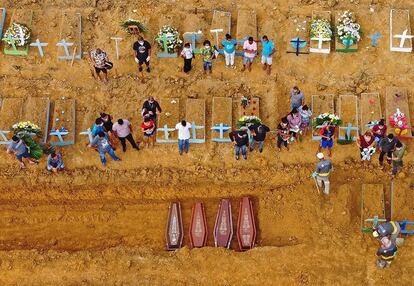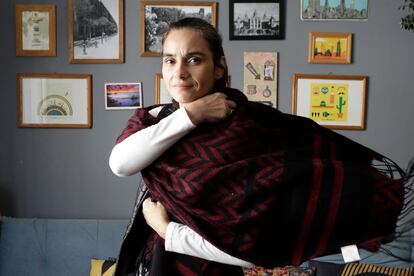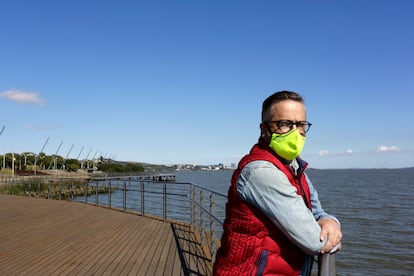Families organize against Brazilian government as Covid-19 death toll exceeds 400,000
The victims association Avico is demanding accountability from the Bolsonaro administration, which it accuses of negligence


For Paola Falcetta, the worst came to pass in the early hours of March 2. Her mother’s breathing had stopped completely as she lay in the hospital in Porto Alegre, southern Brazil. Italira Falcetta da Silva, 81, contracted coronavirus after being admitted for cardiovascular surgery in late January, and was kept in isolation for weeks. By the time she was transferred to a general ward, she was free from the virus but doctors said she had little chance of survival. “She was not considered for intubation by then. She was old and there were no intensive care beds. They told me, ‘There’s no equipment to help your mother’,” says Falcetta, a social worker. Instead, Italira represented just another of Brazil’s 400,000-plus victims from Covid-19, which shook her daughter into action.
Dozens of family members who have lost relatives to coronavirus are demanding accountability from the government of President Jair Bolsonaro, and have organized into a group denouncing state negligence. “I use my mourning as strength, trying to prevent other people from going through the same thing as me. This is a tremendous injustice. Brazil has already lived through many, but this one violates the rights of all ages and social classes. Someone has to pay for it,” says Falcetta.
While there is growing concern about India’s spiraling coronavirus figures, the average daily death rate in Brazil is proportionally six times higher
The Association of Victims and Relatives of Covid-19 Victims (Avico) was founded to offer support, but is also a legal movement galvanized by government failings amid the biggest health crisis of a generation. The country’s grim statistics have plateaued at more than 2,000 deaths per day, and surpassed the United States in the rate of deaths per million inhabitants. While there is growing global concern about India’s spiraling Covid situation, in Brazil the average daily death rate is proportionally six times higher at 11.44 fatalities per million people, while the Indian rate stands at 1.93 per million people, according to the Oxford University’s Our World In Data website.
On the association’s WhatsApp group, about 100 members share the pain of losing loved ones, offer support to one another and discuss strategies for justice against the alleged failings of federal and local governments in tackling the crisis. They prepare evidence to challenge everything from the distribution of the so-called “Covid Kit” – a cocktail of drugs with no effect on the virus – to the absence of support for sufferers of long Covid, whose symptoms linger for months. “Someone has to listen to us. It is impossible for the pandemic to be solved by the authorities alone. We, as victims, are rendered invisible. How are we staying alive? How are we supporting ourselves?” asks Paola Falcetta. “If no one sees what we are going through, we will have no other way to stop all these deaths, which are a public responsibility. Brazil is a country renowned for its vaccination programs, and it has a solid public health system. But we have done nothing to stop the virus in over a year.”

The first attempt at accountability for Brazil’s politicians has already been launched. Senators set up a parliamentary commission of inquiry (CPI) to verify whether the government had failed in its responsibilities to battle the pandemic. President Bolsonaro’s policy on the pandemic has been erratic throughout the crisis. He has denied the seriousness of the virus, said Brazil had to choose between public health or the economy, sabotaged social-isolation measures, spread propaganda for ineffective drugs and questioned the safety of vaccines for months. His government was slow to negotiate public access to Covid-19 vaccines with pharmaceutical companies, and the pace of the inoculation campaign remains sluggish due to shortages.
No fewer than four people have served as health minister during the pandemic – Luiz Henrique Mandetta, Nelson Teich, Eduardo Pazuello and Marcelo Queiroga – and all are expected to testify before senators in the coming days. The senate will also investigate why the Covid Kit was recommended to treat the disease within indigenous communities. Relatives of the victims argue the commission of inquiry should act now, and are demanding their own answers. They want the authorities to be held accountable for Brazil’s tragedy.
“I lost my father and my mother on the same day due to lack of oxygen.”
One of the most dramatic symbols of the coronavirus crisis in Brazil is the lack of oxygen in hospitals that caused several deaths in the northwestern city of Manaus. This is also under scrutiny in the parliamentary inquiry, and the commission will seek to determine whether the authorities failed to act, and whether they were aware of the collapse of the health system in Amazonas state. “I lost my mother and father on the same day due to lack of oxygen in the hospital. They both died within half-an-hour of each other. We can’t accept such a lack of responsibility when dealing with human life, from those who could have prevented such a tragedy,” says business administrator Iyad Amado, 39.
His father Amado Ali Hajoj, 74, caught the virus in December. Doctors prescribed medication including Ivermectin (an antiparasitic drug) and Azithromycin (a bacterial antibiotic), and he started receiving oxygen at home, but in early January he had to be admitted to hospital. Iyad’s mother, Zahieh Hajoj, 65, was then hospitalized a few days later with Covid-19. This couple, of Palestinian descent, had built their life together over 40 years in Manaus. On January 14 of this year, chaos broke out in the city’s hospitals due to the lack of oxygen supply, and Iyad received a call asking him to bring an oxygen cylinder. When he was already on his way, the hospital informed him that it was no longer needed.
He was not told the reason – that both his parents had already died – until he arrived. A nurse and a doctor told him that they tried to help Zahieh with manual ventilation. Iyad says that the medics were very upset as they explained to him that they had done everything they could. “The cause of their deaths was the lack of oxygen, the irresponsibility the authorities showed towards people’s lives during the pandemic, and [the authorities’] denialism,” he says. “I had to identify the bodies of my parents at the same time. They were taken away and buried together. I have lost the most important people in my life, my two pillars. The pain is indescribable. You can’t explain what a loss like this means.”
Iyad places the blame for parents’ death squarely at the feet of the authorities. “I speak now on behalf of the 400,000 people who have lost their lives. A large number of them have left us because of the pandemic, but there were many cases that could have been avoided. We cannot remain silent. Future generations should not understand this as an inevitability,” he tells EL PAÍS by phone from Manaus.

“My mother was almost euthanized”
Paola Falcetta feels the same. “My mother was practically euthanized. She was only administered morphine at the end,” she says. Italira was in tears during video calls as she spoke to her daughter about the fear of dying in the Porto Alegre hospital. Thin and dejected – she lost 18 kilos during her hospitalization – she would ask to be taken home. “My mother died because she caught the virus in the hospital,” says Falcetta. At the time, the healthcare system in Rio Grande do Sul state was close to breaking point. “Obviously, this is not a hospital problem. It is a public administration problem at several levels. There was horrible mismanagement throughout the country,” she says.
Last Thursday, several European Members of Parliament recommended that state authorities who carried out disinformation campaigns be prosecuted, without citing Brazil directly. For some months now, a group of lawyers in the country has said there is enough evidence to investigate Bolsonaro, as well as other government figures, for crimes against humanity during the pandemic. These cases could be brought before the International Criminal Court and the Brazilian justice system itself. The Center for Research and Study in Public Health Law at the University of São Paulo, and the human rights organization Conectas Direitos Humanos also published a study that declares Bolsonaro undertook an “institutional strategy to spread the coronavirus.”
Following the death of her mother, Falcetta also started looking for friends who worked in the area of human rights and partnered with the lawyer Gustavo Bernardes, who also fought in the campaign against HIV. Together, they set up the victims’ association Avico. Since then, both receive messages from others suffering the effects of the pandemic across Brazil. There are already about 100 members and volunteers at Avico, and while some simply want to share their pain, others ask for legal support to fight in court – either because they lost their jobs after recovering or because they lost relatives who financially supported them. Some now risk being evicted because they cannot pay their mortgages. “It is impossible to remain silent in the face of what is happening,” says Falcetta. “People are being terrorized due to the state’s lack of action. They come to us broken, but wanting to help.”

“Those in charge can’t think they can do whatever they want”
Bernardes explains how the first group was created to support families who were grieving, with mental health volunteers. They know that the political advocacy work they are beginning – Avico expects to be officially registered this week – has a long road ahead. For the time being, they are negotiating for a public hearing in Congress for the victims. “We cannot continue to be secondary in this story,” says Bernardes, who was hospitalized with Covid-19 for a month in November last year, including for 10 days on a ventilator in intensive care. He lost hope, he says, and even said goodbye to his family. “I could see what was going on from the inside. Entire families being hospitalized with no one left to bring them a toothbrush,” he tells EL PAÍS. After being discharged, Bernardes felt lingering effects from the disease that doctors did not understand. Suffering from extreme tiredness, memory lapses and body aches, he could hardly work. “That made me see how people who got sick and have to work are suffering, and how the state is not prepared to help them. We will demand that from the authorities in court,” he says.
Avico also intends to prosecute public figures, including Bolsonaro. The association argues that the government’s delay in negotiating vaccine shipments led to the deaths of many Brazilians. “We also want to hold to account those who are defending ineffective treatments,” says Bernardes. “We have received complaints from people who received home visits to promote the Covid Kit. We are recommending that they request the prescriptions in writing in order to take legal action.” Falcetta argues that many things could have been done over the last year to minimize the tragedy, and laments that even watchdogs have been slow to ask for explanations. “Are we going to continue to let people die without doing anything? After a year, the Public Prosecutor’s Office has filed a lawsuit to force the Health Ministry to create an information campaign. Why now and not before?” she asks. “Those who have lost relatives given the Covid Kit have to be compensated.”
She concludes: “Those who had the wrong attitude have to be held accountable so that history does not keep repeating itself. Those in charge cannot think they can do whatever they want.”
Tu suscripción se está usando en otro dispositivo
¿Quieres añadir otro usuario a tu suscripción?
Si continúas leyendo en este dispositivo, no se podrá leer en el otro.
FlechaTu suscripción se está usando en otro dispositivo y solo puedes acceder a EL PAÍS desde un dispositivo a la vez.
Si quieres compartir tu cuenta, cambia tu suscripción a la modalidad Premium, así podrás añadir otro usuario. Cada uno accederá con su propia cuenta de email, lo que os permitirá personalizar vuestra experiencia en EL PAÍS.
¿Tienes una suscripción de empresa? Accede aquí para contratar más cuentas.
En el caso de no saber quién está usando tu cuenta, te recomendamos cambiar tu contraseña aquí.
Si decides continuar compartiendo tu cuenta, este mensaje se mostrará en tu dispositivo y en el de la otra persona que está usando tu cuenta de forma indefinida, afectando a tu experiencia de lectura. Puedes consultar aquí los términos y condiciones de la suscripción digital.








































